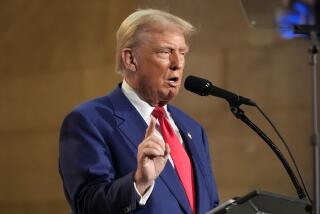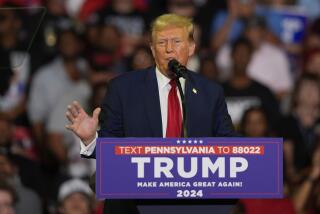Cheney Defends President’s Economic Stimulus Package
- Share via
WASHINGTON — Vice President Dick Cheney took the lead in defending the administration’s economic recovery proposal Friday, delivering a point-by-point response to critics as he urged swift passage of the $674-billion plan.
He predicted that, over the long run, President Bush’s plan would reduce the federal deficit, not worsen it; yield more money for states, not less; and spread the savings to more people than critics acknowledge by eliminating the tax on corporate dividends.
Bush’s plan “will generate new growth, will expand the tax base and thus increase tax revenue to the federal government ultimately,” Cheney asserted.
It was no accident that Cheney’s audience was the U.S. Chamber of Commerce, a trusted ally on big-business priorities. The White House hopes that sympathetic businesspeople will prove a potent lobbying force in persuading skeptical lawmakers -- especially Republican moderates -- to support Bush’s plan without seeking wholesale changes.
Since the president unveiled his stimulus package Tuesday, Democrats launched a furious assault, calling many of its details skewed to benefit the wealthiest Americans.
A few Senate Republicans also have expressed reservations about some of the plan and questioned whether it would sufficiently help jump-start the economy.
Given the almost-solid Democratic resistance to Bush’s proposals in the Senate, the concerns of even a few Republican senators take on significance because Republicans control the Senate by only a two-vote margin.
While Bush has lashed out at Democrats for practicing what he calls “class warfare” in their attacks on his plan, it was left up to Cheney to respond specifically to their charges.
The vice president opened with a detailed review of the administration’s economic policy, which he credited with softening the blow of the recession that began in early 2001. Cheney went on to ask the country to trust Bush’s latest prescription for an ailing economy.
Cheney said the $1.35-trillion, 10-year tax cut that the administration pushed through Congress in mid-2001 “came just in time, putting a floor into the recession and helping us weather the terrible financial effects” of the Sept. 11 terrorist attacks.
He added that a Bush-backed economic stimulus bill, enacted in March, led to increases in business investment in the second and third quarters of 2002.
The vice president’s presentation won no immediate Democratic converts on Capitol Hill.
“The administration’s plan won’t boost the economy, it won’t make our homeland more secure, it won’t make health care more available or more affordable, it won’t expand educational opportunity for the young, or strengthen Social Security for the elderly,” said Senate Minority Leader Tom Daschle (D-S.D.).
“Instead, by putting us deeper into deficit and debt, it makes all of these things harder to achieve.”
Cheney spoke shortly after the Labor Department reported that while unemployment in December held steady at 6%, private employment declined by 101,000 jobs.
White House Press Secretary Ari Fleischer said the president believes that those numbers provide “another reason” for quick congressional passage of his proposal.
As a part of the measure, Bush proposes accelerating the income tax cuts passed in 2001 -- a move that Cheney said would “speed economic recovery and the pace of job creation.”
The centerpiece of Bush’s plan is the abolition of taxes on corporate dividends, a proposal that Democrats say would disproportionately benefit the wealthiest Americans. But Cheney disputed such assertions.
“The fact is that 54 million Americans own stocks that pay dividends. Moreover, 45% of all dividend recipients make under $50,000 per year,” he said, adding:
“Three-fourths of them make less than $100,000 per year. And it’s important to remember that more than half of all dividend income goes to America’s seniors, many of whom rely on these checks as a steady source of income in their retirement.”
Cheney said the dividend proposal would “immediately draw more money into the equity markets, providing the capital needed to build and expand plants, to buy equipment and to hire more people. And this tax reduction will return as much as $30 billion a year to the American people to spend and to invest.”
“In the end, we must weigh the cost of the president’s proposals against the cost of an economic slowdown,” Cheney said.
*
Times staff writer Richard Simon contributed to this report.
More to Read
Get the L.A. Times Politics newsletter
Deeply reported insights into legislation, politics and policy from Sacramento, Washington and beyond. In your inbox twice per week.
You may occasionally receive promotional content from the Los Angeles Times.










